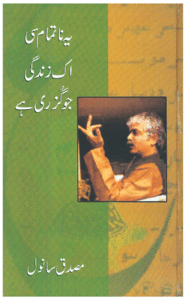
KARACHI: At the launch of journalist Muhammad Ali Siddiqi’s book, From Religion to Fascism: Memoirs of a Journalist, a wide cross-section of society was in attendance, ranging from opinion-builders, journalists, former senators and MPAs, as well as friends and family.
This was an indication of the impact of Mr Siddiqi’s work spanning decades, especially in his capacity as editorial writer at Dawn newspaper.
Mr Siddiqi spoke about HEC Distinguished National Professor Sharif Al Mujahid who was to preside over the launch organised at the Karachi Press Club on Sunday but was unable to attend due to an injury. Mr Siddiqi said that Mr Mujahid had written extensively on the freedom movement for the past 60 years and was possibly the most quoted Pakistani author in the western world with regard to the subcontinent.
Mr Mujahid had asked his daughter to read out all that he had written for the launch ceremony.
Noreen Mujahid read out her father’s speech with much flair. “The book is much more than a memoir,” she read. “The title indicates Pakistan as the theme of the book but I feel it is Mr Siddiqi’s perception of Pakistan in the past six decades, as well as about Karachi, journalism in Pakistan, and events the country has undergone during this period.”
Mr Siddiqi recalled the time when he started work on the book. “I started writing my memoir in 2007,” he said. “Also, I am not the hero of this book. In fact the hero is Mr Ahmad Ali Khan, the former chief editor of Dawn.”
According to Mr Siddiqi, “it is then not a coincidence that Khan Sahab’s death anniversary also fell on the day of my official book launch”.
Mr Siddiqi spoke at length about the days when journalism in Pakistan suffered on account of the ever changing political landscape. He recounted the time when Mr Khan became the editor of Dawn in Feb 1973.
“The country had been broken into two, the newspaper had shrunk to mere six pages, advertisements were no longer available as industries had been nationalised. It was in such an environment that Khan Sahab took up the mantle as editor and when in 2000 he retired, the face of the newspaper had been completely turned around.”
Kamal Azfar, former governor of Sindh, spoke about the term fascism, and commented on its occurrence in Pakistan. He said although there had been several instances of fascism in Pakistan in the past, “believing that the country will eventually decline towards fascism is not essential”.
“Pakistan is becoming more plural and is now evolving into a nation. Also, the women of Pakistan will not allow fascism to be imposed in the country,” he added.
Former minister for information Javed Jabbar elaborated on how religion when brought into the public domain “tends to possess a coercive element, which is present even in secular countries”.
Commenting on Mr Siddiqi’s writing style, he said that it felt as if the book had been written by “James Joyce’s spiritual cousin. It adopts a topsy-turvy, stream of consciousness approach which comes off as natural and spontaneous”.
However, the highlight of the event happened when Mr Siddiqi’s granddaughter Maleeha came onstage to speak about the man she affectionately calls ‘Baba’.
“For those who do not know, Baba has written more than 3,000 editorials in Dawn and has also written for international newspapers such as LA Times, The Washington Times and Arab News.”
His work, she said, encompassed the political, social and economic history of Pakistan. “And so if in the future I decide to do a PhD on the history of Pakistan, his writings will be enough to help me grasp the subject.”
Mr Siddiqi acknowledged several staff members who helped him at different stages while writing the book.
Other speakers at the event included Aftab Shaaban Mirani, Zubeida Mustafa and Ghazi Salahuddin.
Published in Dawn, March 14th, 2016













































